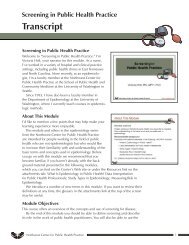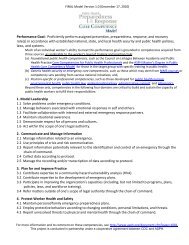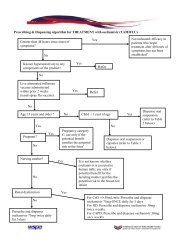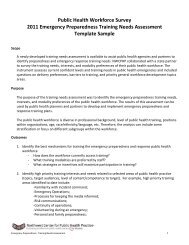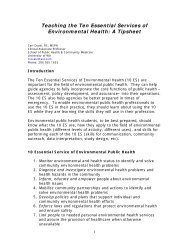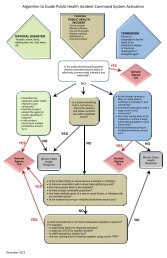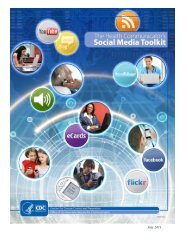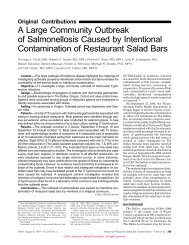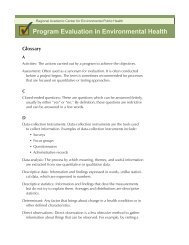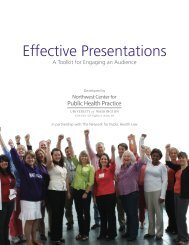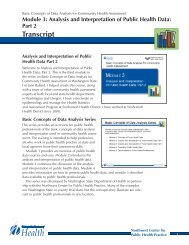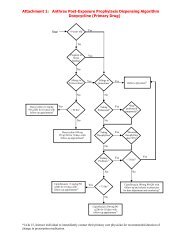Effective Adult Learning - Northwest Center for Public Health Practice
Effective Adult Learning - Northwest Center for Public Health Practice
Effective Adult Learning - Northwest Center for Public Health Practice
You also want an ePaper? Increase the reach of your titles
YUMPU automatically turns print PDFs into web optimized ePapers that Google loves.
Let’s look at another example of a poorly defined set of learning objectives and their improved, well<br />
defined counterparts. The following objectives were developed <strong>for</strong> a public health law course.<br />
“Be<strong>for</strong>e” learning objectives<br />
(poorly defined)<br />
After completing this course you will be able to:<br />
• Be aware of legal terms.<br />
• Improve working relationships with lawyers.<br />
• Have an increased awareness of public health<br />
law.<br />
“After” learning objectives<br />
(well defined)<br />
After completing this course you will be able to:<br />
• Recognize legal issues.<br />
• Formulate legal questions.<br />
• Implement effective strategies <strong>for</strong> working with<br />
legal counsel.<br />
• Describe key principles of public health law.<br />
• Identify key public health laws that govern<br />
leadership’s responsibilities, authority, and<br />
limitations.<br />
These objectives do not indicate observable<br />
behaviors, making assessment of their mastery<br />
impossible.<br />
How does one know if someone knows or is<br />
aware of something? What does it really mean to<br />
improve working relationships?<br />
These objectives are measurable as they are built<br />
around tasks. Instead of the vague objective to<br />
“be aware of legal terms,” the learner knows<br />
exactly what is expected. Rather than seeking<br />
“an increased awareness of public health law,”<br />
the course is asking the student to “describe key<br />
principles of public health law and identify those<br />
that govern leadership’s responsibilities, authority<br />
and limitations.”<br />
The following learning objectives are from a legal course dealing with minor consent, confidentiality<br />
and mandatory reporting:<br />
“Be<strong>for</strong>e” learning objectives<br />
(poorly defined)<br />
After completing this course you will be able to:<br />
• List what is meant by consent.<br />
• Identify requirements <strong>for</strong> agencies.<br />
• Be able to explain confidentiality.<br />
“After” learning objectives<br />
(well defined)<br />
After completing this course you will be able to:<br />
• List four types of health care to which minors<br />
are able to consent.<br />
• State requirements of Title X agencies <strong>for</strong><br />
providing reproductive health services to<br />
minors.<br />
• Describe the role of confidentiality in<br />
providing health care to minors.<br />
www.nwcphp.org <strong>Effective</strong> <strong>Adult</strong> <strong>Learning</strong>: A Toolkit <strong>for</strong> Teaching <strong>Adult</strong>s | 17



